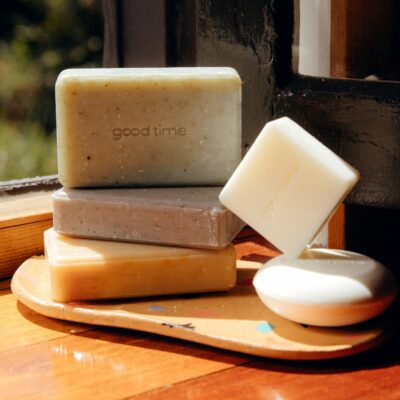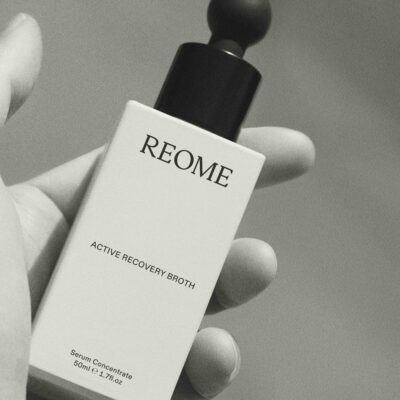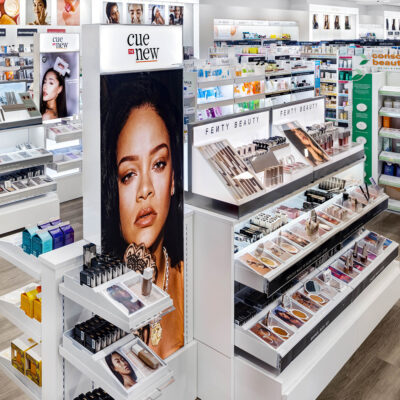
What Retailer Should Rhode Choose?
A lucky retailer will soon bag one of beauty’s biggest prizes, Rhode.
Two years after starting in direct-to-consumer distribution, the skincare brand connected to Hailey Bieber is believed to be entering either Ulta Beauty or Sephora this year. Beauty industry chit-chat pegs Ulta as Rhode’s pick, but Sephora is the talk of TikTok as its preferred retail path.
AvidAI CEO and co-founder Brooke Yoakam, who delivers branding and marketing insights on TikTok under the handle @thebrandblueprint, predicts Rhode will land at Sephora in a December video that’s garnered over 340,000 views. She says, “I’m still so shocked that Rhode is not in Sephora yet or Ulta…I need to be able to buy these lip treatments in person. I think Summer Fridays does so well because they are online and in Sephora, and so I think when Rhode gets into Sephora, they’ll have huge competition.”
Not dissimilar from Bieber BFF Kylie Jenner’s social media prowess that laid the groundwork for Kylie Cosmetics’ sale to Coty, Bieber has an uncanny ability to use TikTok and Instagram to stoke viral trends and product frenzies. Rhode’s $29 Peptide Glazing Fluid amassed a waiting list of 100,000 people prior to the brand’s launch in June 2022.
Also at launch, three flavors of Rhode’s $16 Peptide Lip Treatment sold out in three days and accumulated a waiting list of 440,000, according to the publication Glossy, which reported that customers were closing in on snapping up 1 million Peptide Lip Treatment units by August last year, putting the product’s sales at nearly $16 million. Before it was available in February, some 200,000 people were on the waiting list for Rhode’s product-cradling Lip Case, the only iPhone case that’s caused almost as much mania as a new iPhone release.
Bieber will no doubt make the windup to Rhode’s retail debut a marketing home run. In advance of it, we decided to dig into what the brand’s retail plans could be. For the latest edition of our ongoing series posing questions related to indie beauty, we asked nine retail strategists, consultants and investors the following questions: Do you think Rhode will launch at Ulta or Sephora this year, or should it pursue another distribution strategy altogether? What advice would you give the brand on its brick-and-mortar strategy?
- Karen Hayes Founder, Indie Global Strategies
Entry into Ulta or Sephora would be a natural progression for Rhode Skin. For prestige brands to reach top 10 or 20 status in the U.S., all roads generally lead to Ulta, Sephora or Target.
While Bieber and Rhode Skin have built enviable awareness in less than two years, wholesale distribution is the way to achieve category dominance. So, entering one of these three retailers makes sense to further scale the brand beyond DTC.
Ulta probably needs Rhode more than Rhode needs Ulta, with the brand’s ability to attract a certain segment of gen Z customers. The Target environment doesn’t inherently provide the accessible luxury experience that the brand conveys, so it would feel like a mismatch.
Amazon might be inevitable, but isn’t necessarily the best option this early in the brand’s trajectory, when brand building is paramount.
To me, Sephora feels like a natural fit, not only for its existing customer base and brand peers like Summer Fridays and Rare Beauty—founder feuds not withstanding—but also given its global footprint.
A successful Sephora U.S. partnership would then pave the way for Rhode Skin to quickly launch and scale with the retailer in Canada, Europe and other markets where Sephora is dominant.
The brand has a built-in global audience thanks to Bieber’s broad reach, and they’re in a prime position to move quickly on international expansion, although that also needs to be planned carefully and resourced adequately.
One hurdle the brand should anticipate is impact on team and organization. As far as I can tell, Rhode Skin’s leadership team does not have much Sephora or Ulta experience between them. The recent hire of Nick Vlahos as CEO would imply that they’re working to strengthen their bench for an entry into wholesale. (He may favor Ulta given existing relationships).
That said, most of the organization’s collective background appears to be in fashion and DTC, so they would be wise to round out their team with commercial and marketing leaders and managers who have direct Sephora and/or Ulta expertise or via consultants who can upskill their current team.
Getting into one of these major retailers is just the beginning. Building a successful Sephora or Ulta business is complex and resource intensive. Without seasoned operators it will be extremely challenging and ripe for unnecessary mistakes along the way.
Whichever path is chosen, the prospects are promising. It will be exciting to see what this beautiful brand does next.
- Rachel Roberts Mattox Brand Developer, Strategist, Advisor and Founding Member, The Board
My instinct is that Rhode is best positioned for Sephora.
Rhode is in a rarified class of celebrity-founded beauty brands that leverages its founder’s star power in the right way. Bieber is culturally relevant, and she is able to drive trends with products, content and brand collaborations that keep both her personal brand and her beauty brand consistently in the cultural conversation. I believe this is crucial for success at Sephora.
But Rhode does not rely on Bieber’s star power alone, which is equally important. The product strategy is pitch perfect: streamlined, scientifically proven, sensorial, universal, adaptable and price accessible. All of this is delivered in chic, viral-worthy packaging, checking all of the boxes for Sephora’s customers’ priorities.
But, of course, landing in Sephora and scaling in Sephora are two different things. I’ll be curious to see how Rhode’s product strategy evolves once it enters retail. The “one of everything good” is a concept that resonates with the time-strapped, budget-conscious consumer who still wants a premium experience.
But this positioning doesn’t lend itself to rapid product launches and SKU proliferation, which is often the strategy when a brand enters a national retailer. Rhode will need to carefully balance product expansion with their brand positioning.
Also, while entering Sephora requires a significant investment of resources and capital, I would recommend that they still prioritize their DTC experience and brand collaborations, which will continue to drive awareness and keep the brand on the cutting edge of cultural relevance.
While Ulta has a similar customer as Sephora, they do not have a global footprint. I see Rhode being successful in Europe and Australia and also India, an emerging market that shares many consumer attributes with the U.S. I see Rhode following a similar trajectory as Fenty and Rare Beauty, expanding internationally within the first few years of its U.S. retail launch.
- Sarah Broyd Partner, Clarkson Consulting
Hailey Bieber is playing perfectly into consumer trends with Rhode. She is capitalizing on ‘minimal beauty,’ a trend that she helped drive with her own look. In addition to the minimalist look, her minimalist packaging aligns with the overall feel of the brand. Further building on that minimalism, she carefully crafts her ingredients and creates transparency with the products on her website.
Her brand’s price points and target audience suggest that the brand will do better at a higher price point in retail. From a brick-and-mortar perspective, Sephora will align better from a shopper and brand positioning standpoint than Ulta, which tends to carry a wider product variety and lower price point.
Bieber has driven interest and excitement through social media about her brand, and the anticipation of a broader launch is growing. But, should she go into retail right away? Maybe not. Her platform and her ability to influence is substantial. Her self-image and brand carry enough weight to continue to drive consumers to a website and sell direct to consumer in the short term.
Fully launching into retail, with high anticipation, but without clear supply and demand signals, brings a lot of risk. If out of stocks occur early, younger in-store shoppers may grow impatient and buy another brand while in store.
I’d personally use Bieber’s website as a test ground to launch her portfolio of products to see which ones are most popular and to stabilize supply and demand. She has an opportunity to continue to drive engagement on her website and then promote a second launch once the company is more mature and stable enough to go into retail. In addition to building strong relationships with her consumers, she will build better relationships with retailers when getting on (and staying on) the shelf.
- Rich Gersten Co-Founder and Managing Partner, True Beauty Ventures
We believe that pursuing a retail/brick-and-mortar strategy is a critical step in building a long-lasting beauty brand. It is why it has become a key investment criteria for us, and it is not a coincidence that almost all of our brands are distributed within either Ulta or Sephora. The two retailers have unique differences, but they are both critical to the growth of the industry.
Both have consistently experienced strong growth and continue to pull market share away from legacy department store distribution. Few consumer categories have a healthy, growing and vibrant specialty retail channel in the U.S., but beauty does, further demonstrating why beauty is the most attractive investment segment within the broader consumer sector.
Ulta is better known for its wider range of pricing from mass to masstige to prestige as well as its focus on haircare due to its salon channel.
Sephora, on the other hand, has primarily focused on the prestige segment and has also had more success supporting smaller indie brands and scaling them to exit as seen with brands such as Youth to The People, Ouai, Sol de Janeiro, Drunk Elephant and more (many of these have now expanded to Ulta post-acquisition). We still consider Sephora to be a better place for discovery, and they have a track record helping small brands scale.
For Rhode, the brand has potential to be successful in either channel. The brand has masstige pricing, so not too expensive for the Ulta consumer, but also premium enough for Sephora. The brand appeals to a gen Z and millennial audience, both of whom shop across these two retailers.
However, the core reason the brand likely has the unique ability to succeed in either retailer is a result of the brand’s ability to create organic demand and drive their consumers to store to purchase. With the initial DTC success of the brand, it is clear that Hailey and the team are able to create explosive growth and key moments of virality that have the ability to drive traffic and purchases to whatever retailer they partner with.
Our advice to all brands navigating this next step would be to understand the role of the retailer as you launch. Once you have established the right fit for the brand based on pricing, store placement, demographics, etc., it is important to know how to succeed within the retailer.
The retailer will expect the brand to invest in the success through paid programming, advertisements and in-store education. A brand that has been successful online must now pivot their marketing tactics to also drive that momentum to the retailer. The organization will also need to be augmented with people experienced with retail channels as the skillsets are different than DTC.
One last thought: Always remember that brands build brands and retailers do not.
- Tina Bou-Saba Investor
I'm not surprised to hear that Rhode may be considering entering retail this year. I think that it's generally understood that scaling beyond a certain point in beauty requires a brick-and-mortar presence. The market of people who buy beauty products online through DTC websites is naturally limited in size. Consumers like to try products IRL, and they also like the loyalty programs at Sephora and Ulta. This is simply the reality of the market, even for an influencer or celebrity with the reach of Hailey Bieber. Glossier's experience - and its relatively recent entrance into Sephora, which by all accounts has been successful - is an example of this dynamic.
That said, I always counsel brands to approach distribution decisions through a strategic lens. In other words, what is the objective? Is it to build awareness, drive sales, establish credibility, all of the above, or something else? Thus far, Rhode's scarcity - including limited quantities of buzzy products and long waitlists - appears to have positively contributed to the brand's cache. This reminds me of the early days of Kylie Cosmetics’s lip kits. They were unique and special, and consumers loved the sense of exclusivity. I think that this is the case for Rhode products today.
If Rhode pursues large-scale retail distribution, there will be necessary trade-offs. In a retail setting, stock-outs and scarcity represent major problems that lead to customer disappointment, not competitive advantages. What does Rhode lose when all of a sudden anyone can buy it at hundreds (or more) of beauty retail stores? Moreover, success at retail requires quite a bit of capital. I have no doubt that investors are chomping at the bit to partner with Rhode. But is this the right strategic decision for the business? The leadership team should think through this carefully.
Bottom line - always start with strategy. Brands large and small need a strategic framework against which to weigh major business decisions.
- Chelsea Grayson Board member, Xponential Fitness and former board member, Morphe Cosmetics
If Hailey Bieber decides to launch a retail strategy for Rhode, an event that will make my 22-year-old daughter very happy, I would advise a hybrid, staged approach that would launch with some presence in Ulta and/or Sephora. I use the word "or" here because getting shelf space might be conditioned initially on exclusivity.
Ultimately, they could round things out with one or two flagship stores more for marketing and brand halo purposes than as moneymakers and a limited Amazon storefront to pick up the customers who like the one-stop shopping, “buy again” experience of that platform.
One advantage of showing up on the shelves of Ulta/Sephora is the exposure to the many eyeballs that the brand might not reach right now, including millennials and gen alpha at the older end of their respective spectrums. Specifically, a millennial woman in her upper thirties to lower forties might not be ready for more heavy-hitter skincare regimens, but she does want the glowy, youthful appearance that Rhode offers.
The shelves of Ulta and Sephora might give this woman her first exposure to Rhode products, if she isn't spending her time on TikTok. And gen alpha pre-teens walking around in the store while their moms are shopping will have early exposure to the brand, which plays into the pro-girl clean face message.
And, of course, sitting on shelves next to established brands lends credibility to Rhode and attracts the consumer that likes to stick with traditional, reliable brands rather than trusting brands that are only available on the brand's e-comm site. A great example of this is the additional groundswell Fenty Beauty picked up when it joined the ranks on Sephora's shelves.
Another advantage is that patrons of Ulta and Sephora might have access to rewards, points or special discounts that enable or convince them to make purchases they wouldn't make on the brand's DTC platform where those incentives might not exist. Also, while Bieber may or may not have leverage to negotiate the most beneficial terms at the start of the relationship, both Sephora and Ulta reward brands with better terms—financial and store placement—as they climb and top their leaderboards.
Rhode will likely do better than other celebrity brands because of her hyper-engaged audience, her clear dominance in the "glazed donut" category and the quality of her products.
In addition to these points, when Rhode expands the number of SKUs they provide, they will have more flexibility to place certain products or even entire lines in Ulta and/or Sephora while reserving certain others just for their DTC customers.
Finally, both Ulta and Sephora have developed shop-in-shop partnerships with big-box stores like Kohl's and Target, so Rhode might be able to negotiate a nice opportunity for some presence there as well.
- Kara LaForgia Founder, Kaz Consulting and general partner, Kaz Ventures
When considering whether Rhode should specifically choose Ulta or Sephora, I can't firmly assert one over the other. However, generally speaking, if Rhode has a solid supply chain and the right operators in place to scale at a sizable beauty retailer, they should certainly explore retail as a channel.
I always advise my portfolio company founders to consider distribution options from day one, often even before launch. All brands eventually need to play in the retail sandbox if their goal is to ultimately be acquired.
There are numerous reasons why Rhode should explore retail, but some stand out: It offers free marketing with profit potential, unparalleled brand exposure, access to a customer base beyond direct-to-consumer reach, enhances brand credibility, facilitates building a local presence, acts as a discovery platform, satisfies consumers' desire to interact with products before purchasing, and most of all, helps diversify risk mitigation.
I've never been particularly bullish on brands that rely predominantly on direct-to-consumer sales. It's too expensive to maintain and doesn't foster the organic growth of a legacy brand. Additionally, customers of solely direct-to-consumer brands are often not as loyal.
My advice to not only Rhode. but any brand exploring retail as a channel is to carefully consider the partners they choose. Brands can become excited about partnering with major retailers, but fail to fine-tune the partnership terms, which can be fatal.
Negotiating strong margins/initial markup, shipping cost coverage, minimum order and reorder quantities, strategic door count, thoughtful merchandising displays and more are crucial aspects. Rhode should inquire how the retailer plans to collaborate with them to bolster their brand and achieve long-term growth.
Implementing a prudent marketing plan and collaborating with the retailer on social exposure, in-store events, giveaways, email features and landing page displays is critical. While negotiating marketing aspects into a partnership can be challenging, especially for smaller, lesser known brands, Rhode should have no issues with a powerful, influential founder at the helm. Rhode should also discuss a three- to five-year growth plan/road map in initial conversations with potential partners.
Lastly and perhaps most importantly, Rhode should choose a partner that is equally enthusiastic about the collaboration. This enthusiasm fosters the most fruitful and long-lasting partnerships.
- Rohit Banota Founder, Jump Accelerator
Rhode is a well-thought-out beauty brand that has hired the best people like Ron Robinson, founder of BeautyStat Cosmetics as one of its chemists to hiring top of the line marketers. For a celebrity like Hailey Bieber, who is the face of Rhode, both short-term and long-term success point to Ulta. Why?
Ulta offers more value for consumers than Sephora and due to its price points, brand identity and packaging. Rhode will probably not face as much competition on Ulta’s shelves. Plus, Rhode will bring new value consumers into Ulta, those already aware of Hailey, but shop at other value retailers.
One factor in favor of Sephora would be the international presence as Hailey is a global personality. However, Rhode's exit strategy can factor the global potential without the headache of international operations.
A few more points:
-Incremental innovation: There are no new ingredients or transformational stories for Rhode’s products beyond incremental improvements, something the brand itself claims on the site. So, market penetration is the objective and that's the whole reason it should look to Ulta with bigger distribution.
-If Rhode doesn’t offer an incremental innovation over others in Sephora, which has some amazingly aesthetic brands and a more discerning consumer base that not are not easily swayed by celebrity status, then it will have a hard time selling even at affordable price points there.
-Speed of market penetration is driven by value and that is always in comparison to competition. So, at Ulta, Rhode will not be as price competitive as at Sephora, and therefore the aesthetics of their packaging plus incremental product benefits over other brands will matter. Rhode is likely to win the value game at Ulta for the masses with both current and new Ulta consumers. Sephora’s most successful brands are usually distributed around higher price points in every category, so relevance could be low at Sephora.
-Retailer support: Sephora has incredible support programs for brand discovery and newness, whereas Ulta favors brands that have resources and that are a bit more evolved in their life cycle. This is where Rhode could outdo the other brands in its competitive set.
-Short term versus long term: Every brand needs four types of innovation: storytelling innovation for winning the quarter, incremental innovation for winning the year, transformation for winning the next two to three years and disruption for winning the next five years and beyond. The probability of success decreases with these timelines. Rhode has still not launched anything transformational, let alone disruptive, and is therefore focused on the first two, meaning an exit is what they will look for.
So, make hay while the sun shines. After the JLo Beauty debacle, Sephora will be more skeptical of Rhode and will look at it from a shorter term perspective, whereas Ulta’s operating model is more aligned with shorter horizon innovations, brands that need less nurturing and have the resources to play the game at retail.
- Paula Floyd Founder and CEO, Headkount
Distribution decisions are complex, and one of the most important ones for a brand. Accessibility is a key pillar for Rhode, so they may consider entering Ulta because that’s one of the main draws for the Ulta guest.
Rhode products are accessibly priced, and the brand still has an air of exclusivity as its drops sell out quickly. Sephora has a history of capturing brands with major buzz like that like Fenty. If Rhode is seeking to expand globally, Sephora is better poised to do that for them as they have the global footprint.
If you have a question you’d like Beauty Independent to ask beauty investors, strategists and consultants, please send it to editor@beautyindependent.com.





Leave a Reply
You must be logged in to post a comment.